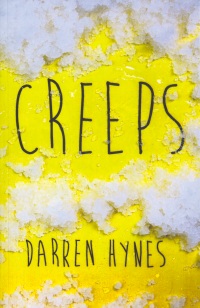| ________________
CM . . .
. Volume XX Number 2. . . .September 13, 2013
excerpt:
Wayne Pumphrey, age 15, can’t wait for high school to be over, but three more years feels like an eternity as he gets picked on and beat up and assaulted day after day by Pete “The Meat” and his gang, made up of Bobby, Harvey, and Kenny. Wayne’s dad is an alcoholic, and his mom is constantly threatening to leave Wayne and his sister, Wanda, alone. When Wayne is rescued from Pete and his posse one day, by a girl named Marjorie, what was already torture begins to get worse. The two become friends and get to know each other through a school drama production until a traumatizing event threatens to tear them apart. Hynes is an obviously talented writer with a simple, but powerful style, often punctuated with moments of humour amidst the darkness, though these moments are few and far between. He tells Wayne’s story through a combination of third-person narration and first-person emotional explorations in the form of un-sent letters to his family, to “God or whoever,” to his teachers, and even to the bullies responsible for his misery (as in the excerpt above.) The relationship between Wayne and his father is perhaps one of the most poignant portions of the novel, exploring the complexities that exist in a family when a parent is alcoholic and refuses to see the impact on others until it is almost too late. The theme of troubled fathers does not stop here. Marjorie’s father committed suicide prior to the start of the novel, and Pete “The Meat”, though he currently has a far less problematic stepfather, had an abusive relationship with his biological father. The theme of troubled dads taints the book with a feeling of hopelessness when it comes to family life. The ignorance shown repeatedly by adult characters throughout the text is extremely troubling. When Wayne’s father, for instance, finds out that Wayne is being bullied, his solution is to tell the bully’s father, but when this does not work, Wayne’s father is actually confused as to why. His mother is also terribly unreliable, attempting to run away repeatedly throughout the book, but never quite doing so, leaving Wayne and Wanda feeling dejected. Wanda desires to move away from home, and though she declares her support for Wayne at various moments, she never truly shows that she actually has his back. Wanda also spouts off homophobic slurs with troubling regularity. Perhaps one of the most unfortunate aspects of the novel is the amount of profanity and abuse streaming from various characters, for no particular reason, especially Pete “The Meat,” almost constantly—the homophobic attitudes in particular, and the use of derogatory terminology for gay and lesbian individuals is, I feel, excessive. While homophobia and bullying are a grievous part of everyday life for many young people no matter their sexual orientation or gender identity, the book fails to move beyond these instances of assault and violence. Some of these situations include Wayne’s being locked in a trunk and being forced to eat yellow snow, and another situation involves Marjorie nearly being raped—and Wayne nearly being coerced into doing the reprehensible act—with a hot dog. This is a moment that may potentially be a trigger for young victims of assault. Filled with verbal and physical assault, suicide, hopelessness, loneliness, homophobia, and near-rape, this book is very much written for a specific audience of resilient young people. As stated earlier, the writing style is not terribly problematic in itself—though the first-person unsent letters are a bit jarring and don’t always flow with the rest of the narration—however the failure of Hynes to move beyond stereotypes and flat adult characters—with the possible exception of Mr. Rollie, the drama teacher, and Mr. Ricketts, the janitor—keeps the story from moving beyond a limited exploration of a very haunted group of young people. The ending is also rather abrupt and seems to exist so readers will see Pete “pay” for his previous actions. This book is not for everyone, and teachers and librarians should be aware of these potentially troubling themes before recommending or handing out the novel to students. Recommended with reservations Rob Bittner recently graduated from the MA in Children’s Literature program at The University of British Columbia and is now a PhD student in Gender, Sexuality, and Women’s Studies at Simon Fraser University in Burnaby, BC.
To comment
on this title or this review, send mail to cm@umanitoba.ca.
Copyright © the Manitoba Library Association. Reproduction for personal
use is permitted only if this copyright notice is maintained. Any
other reproduction is prohibited without permission.
NEXT REVIEW |
TABLE OF CONTENTS FOR THIS ISSUE
- September 13, 2013.
AUTHORS |
TITLES |
MEDIA REVIEWS |
PROFILES |
BACK ISSUES |
SEARCH |
CMARCHIVE |
HOME |
